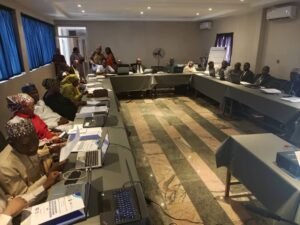By Ramatu Garba
The National Agency for the Prohibition of Trafficking in Persons (NAPTIP), on Monday, commenced training of its officers and other stakeholders on reviewed data collection instruments for the National Action Plan on Human Trafficking in Nigeria.
The News Agency of Nigeria (NAN) reports that the training was organised by NAPTIP in collaboration with the United Nations Office on Drugs and Crime (UNODC), supported by the Swiss Government.
It is a five-day capacity building for NAPTIP Officers, State Task Forces and Civil Society Organisations (CSOs) across Northwest Zone.
NAPTIP Director-General, Hajiya Binta Adamu-Bello, said the training was a component of a broader project titled: “From Policy to Action: Implementation of the National Action Plan on Human Trafficking in Nigeria (2022-2026)”.
Represented by the Kano Zonal Commander of the agency, Mr Abdullahi Babale, the D-G observed that reliable data collection was the bedrock of effective counter-trafficking programming.
“NAPTIP recently undertook an internal review of the agency’s data collection tools, as well as the national template for human trafficking data collection
and analysis to ensure they are comprehensive and responsive to current needs in counter-trafficking.
“This review introduced vital components, such as disability indicators, to promote inclusive data reporting and ensure that no one is overlooked in our anti-trafficking initiatives.
“This alignment standardised the
instruments, ensuring accessibility and effectiveness across various
platforms for multiple agencies responsible for reporting under the
National Action Plan.
“We are now in the process of cascading this training to all national and subnational actors, who have roles in implementing the National Action Plan on human trafficking,” she said.
According to her, data is indeed the life-blood of policy interventions and operations across many fields, particularly in counter-trafficking.
“With reliable data, we can track trends, allocate resources effectively, and develop evidence-based strategies to detect and eliminate human trafficking,” she noted.
Adamu-Bello commended the Swiss Government and UNODC for
their support and commitment to Nigeria’s fight against human
trafficking and for their enduring partnership with NAPTIP.
“The training will significantly contribute to the success of our national anti-trafficking initiatives, enhancing Nigeria’s standing among nations in combating this transnational crime,” the DG added.
The Director, Research and Programme, NAPTIP, Mr Josiah Emerole, described the training as apt, especially as the agency was focusing more on evidence-based programming, “which only proper data collection, analysis and dissemination can provide.”
Emerole, who was represented, by the agency’s Assistant Director Research and Programme, Mr Oluwabori Ogunkanmi, said the administration of President Bola Tinubu was focusing on evidence-based performance from all MDAs in line with the performance bonds signed with Ministers.
“The agency aims at training participants on the developed and reviewed National Action Plan (NAP) reporting framework and harmonised tools at both national and sub-national levels.
“The training will enhance uniform reporting across states in line with the various pillars of NAP.
“It will enhance the use of reporting tools for programming and development of work plans in alignment with NAP,” he said.
Emerole said at the end of the workshop, reporting tools would be used as an accepted template for reporting counter trafficking activities to the agency.
The UNODC representative, Ms Ifeoma Kanebi, encouraged participants to cascade the knowledge acquired to others.
“Let us join hands together towards eradicating human trafficking in Nigeria and safeguarding the rights and dignity of every individual,” she advised.
While commending NAPTIP for their relentless effort in combating human trafficking in Nigeria, Kanebi also lauded the Swiss Government for their support.

The Kano State Coordinator, National Association of CSOs Working Against Human Trafficking, Child Abuse and Labour, Mr Muhamad Mashi, said the training would equip participants with valuable skills and minimise human trafficking in Nigeria. (NAN)